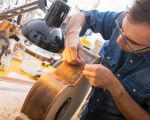Understanding Your Brass Instrument
As a musician who plays a brass instrument, I've come to appreciate the importance of taking good care of my instrument. Whether you play the trumpet, trombone, or tuba, maintaining your brass instrument is essential not only for its longevity but also for producing a beautiful sound. In this article, I'll share my experiences and insights into how to properly care for your brass instrument, ensuring it stays in top condition for years to come.
The Basics of Brass Instrument Care
Brass instruments, unlike string or woodwind instruments, are subject to unique challenges. The materials they are made of, such as brass or other metal alloys, require special attention to prevent corrosion, maintain their shine, and ensure smooth playing. One of the first things I learned as a beginner was that keeping the instrument clean and lubricated is crucial for both its performance and lifespan.
Regular Cleaning: The Key to Longevity
Regular cleaning is the foundation of proper brass instrument care. If you neglect this, your instrument can accumulate dirt, grime, and moisture that affect its sound and physical condition. Here's a simple step-by-step process I follow to clean my brass instrument:
- Disassemble the instrument: Carefully take apart the mouthpiece, tuning slides, and other removable parts. This allows you to clean each component effectively.
- Soak the instrument: I fill a basin with warm water and add a small amount of mild dish soap. Submerge the main body of the instrument and let it soak for 10-15 minutes to loosen any dirt or grease.
- Clean with a brush: Using a soft brush or a cleaning snake, I gently scrub the interior of the tubing to remove any debris or buildup. Be careful not to scratch the surface.
- Rinse thoroughly: After scrubbing, I rinse the instrument with clean water to remove soap and grime.
- Dry and reassemble: Once the instrument is clean, I dry all components with a soft cloth before reassembling it. This helps prevent water spots and ensures that the instrument remains in pristine condition.
Lubrication and Greasing
Lubrication is just as important as cleaning when it comes to brass instruments. Over time, the valves and slides of brass instruments can become sluggish or difficult to move. Proper lubrication keeps these moving parts functioning smoothly. For valves, I use a specific valve oil that I apply to each valve before I play. For tuning slides, I apply a thin layer of slide grease to ensure they move freely without becoming stuck.
Dealing with Moisture
Moisture is a major factor in the wear and tear of brass instruments. When you play, moisture from your breath accumulates inside the instrument. I’ve learned that regular emptying of moisture from the instrument after playing is essential. Every time I finish a practice session, I make sure to drain the water by pressing the water key. It’s also important to wipe down the outside of the instrument with a dry cloth to prevent moisture from collecting on the surface.
Maintaining the Finish
One thing I take pride in is maintaining the shiny finish of my brass instrument. Over time, the metal can tarnish, which diminishes its appearance. While this doesn't affect the sound, I prefer to keep it looking as polished as possible. I use a specialized brass polishing cloth to gently buff the surface and remove any tarnish. It's important to avoid using harsh chemicals or abrasive materials that can scratch or damage the finish.
Fixing Small Issues Before They Become Big Problems
As with any musical instrument, small issues can develop over time. If I notice any of the following, I take action immediately to prevent further damage:
- Sticky valves: If a valve becomes sluggish, I make sure to oil it right away to keep it from becoming fully stuck.
- Loose tuning slides: When tuning slides become loose, I apply slide grease to ensure they stay in place and function properly.
- Leaks: If I notice any air leaks, I check for cracks or holes in the tubing and take the instrument to a professional for repair.
Using the Right Accessories
Having the right accessories can also make a huge difference in maintaining your instrument. I use a mouthpiece brush to keep my mouthpiece clean, and I also keep a cleaning rag handy to wipe off any moisture after playing. Additionally, I always store my instrument in a protective case when not in use to prevent dust and accidental damage.
Taking Your Instrument for Professional Servicing
Even with the best care, every brass instrument eventually needs professional servicing. This is especially true if you notice any significant performance issues like valves sticking, slides not moving smoothly, or a noticeable decrease in sound quality. I take my instrument to a professional repair technician once a year for a thorough check-up and any necessary repairs.
A Personal Experience: The Importance of Regular Maintenance
Let me share a story about how proper care saved me from a frustrating situation. A few months ago, I neglected to clean my trumpet for a couple of weeks. During a performance, one of the valves started sticking, and I couldn’t play as smoothly as I usually do. After the show, I immediately cleaned my trumpet and oiled the valves, but it was a wake-up call for me. Since then, I’ve made it a habit to maintain my instruments regularly, and I haven’t had that issue again. This experience really highlighted how regular maintenance can prevent performance problems.
Conclusion
Taking care of your brass instrument is not just about cleaning and lubrication; it’s about developing a routine that ensures your instrument performs at its best. By following the steps I’ve outlined and regularly maintaining your instrument, you’ll prolong its life and keep it sounding great. Remember, a little effort goes a long way, and your instrument will thank you for it with years of beautiful music!








